El Salvador's State of Exception: A Bold Crime Crackdown or a Threat to Civil Liberties?
In recent years, El Salvador has become a focal point in global discussions about security, human rights, and governance, thanks largely to its controversial "State of Exception" policy. This emergency measure, implemented in March 2022 by President Nayib Bukele, was introduced to curb rampant gang violence that had plagued the nation for decades. While this policy has resulted in a drastic decrease in violent crime, it has also sparked significant debate over its impact on civil liberties and human rights. Below, we explore the State of Exception's goals, outcomes, and the mounting criticisms it faces both locally and internationally.

What Is El Salvador’s State of Exception?
The State of Exception was rolled out as an aggressive response to gang violence and other forms of organized crime in El Salvador. The policy suspends various constitutional rights, giving authorities increased power to detain suspects without warrants, monitor private communications, and restrict public gatherings. As a result, authorities have arrested over 70,000 individuals suspected of being involved in gang-related activities. While this measure has helped reduce the country's homicide rate from one of the highest globally to one of the lowest in Latin America, it has also raised concerns around human rights and accountability.
The Impact of the State of Exception on Crime
Before President Bukele's administration, El Salvador faced one of the highest homicide rates worldwide, often reaching levels far above regional averages. With the implementation of the State of Exception and other security policies, the government has reported a significant reduction in violent crime. Homicides, for example, have dropped to about 1.9 per 100,000 people in 2024, a sharp decline from previous years. For many Salvadorans, this drop represents a restored sense of safety and stability, and it’s a powerful endorsement of Bukele’s hardline approach.
However, these gains have not come without considerable costs, and the methods used to achieve them have sparked debate and scrutiny on multiple fronts.
Key Criticisms of the State of Exception
Despite its success in reducing violent crime, the State of Exception has garnered strong criticism from human rights organizations, legal experts, and international bodies. Here are the primary points of contention:
Mass Arrests and Due Process Violations
The policy has led to mass detentions, with authorities apprehending tens of thousands of individuals, often without concrete evidence or formal charges. According to human rights groups, many detainees are held for extended periods without legal representation or trial, which raises concerns about due process. Reports indicate that individuals have been detained on the basis of mere suspicion, sometimes for arbitrary reasons, resulting in fears of a system prone to abuse.
Abuse and Inhumane Conditions in Detention
The rapid increase in detainees has led to overcrowded prisons where conditions are reported to be deplorable. Human rights advocates and families of the detained have spoken out about abuses, including limited access to food, inadequate sanitation, and poor medical care. Some reports even suggest cases of torture and mistreatment in detention facilities, intensifying calls for reform and accountability.
Minimal Judicial Oversight
The suspension of certain constitutional protections means that law enforcement has expanded powers with limited judicial oversight. Critics argue that this creates an environment where abuse of power is not only possible but inevitable. The bypassing of judicial processes allows law enforcement agencies to act with minimal checks, raising alarms about the potential erosion of legal standards and safeguards.
Disproportionate Impact on Marginalized Communities
Many of those detained under the State of Exception come from low-income neighborhoods where gang influence is common. However, not everyone in these areas is associated with gangs or crime. By broadly targeting such communities, the policy has been accused of disproportionately affecting marginalized groups, many of whom lack the resources or legal means to defend themselves. This broad-brush approach has led to wrongful detentions and fueled resentment among communities that already face social and economic challenges.
International Condemnation
The international community has closely monitored El Salvador’s crackdown, with organizations like the United Nations voicing concerns over the policy's potential normalization. The UN and other international human rights bodies warn that prolonged emergency measures can undermine democratic norms, erode citizens’ rights, and set a worrying precedent for governance in El Salvador. While the drop in crime is seen as positive, the larger implications for democracy and individual freedoms are concerning.
The Balance Between Security and Freedom
The State of Exception in El Salvador highlights a pressing dilemma faced by many countries: How do you protect citizens’ safety without infringing on their fundamental rights? While President Bukele’s policy has undeniably contributed to a dramatic reduction in crime, it also exposes the risks associated with broad and unchecked state power. The policy’s long-term implications for El Salvador’s democracy, legal framework, and human rights record remain uncertain, and its success comes with both relief and controversy.
As El Salvador navigates these challenges, the world watches closely, considering what lessons might be drawn for balancing security and civil liberties. For Salvadorans, the question may come down to a difficult choice: Is the price of safety worth the cost in personal freedoms?